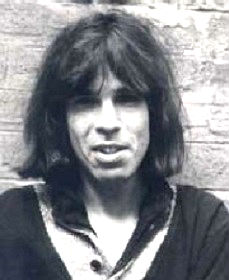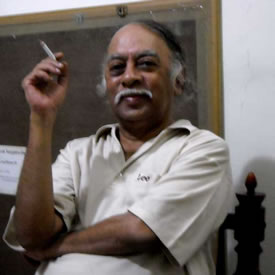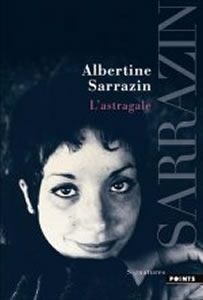De Oostenrijkse dichter en schrijver Ludwig Roman Fleischer werd geboren op 17 september 1952 in Wenen. Zie ook alle tags voor Ludwig Fleischer op dit blog.
Uit: Seewinkler Dodekameron
„Das Zeichenbuch
Wieder einmal Probleme mit dem vaterlosen Vaterhaus im Grenzdorf. Andreas ist in der Stadt geblieben, bei der Mutter, und wird nach der Mutter greinen: vaterloses Einzelkind. Seufzend lenkt sie ihren Kleinwagen an der gedrungenen Kirche vorbei in die Untere Hauptstraße: zwei Reihen ebenerdig hingeduckter Vaterhäuser, deren bestes die Fassade ist. Hier wohnt ein halb bankrotter Landwirt, da ein versoffener Winzer, dort ein Jungbauer, der keine Frau bekommt, weil er Jungbauer ist. Die Dorfmehrheit wird von Nebenerwerbstätigen und Alten gestellt, die Jungen pendeln oder wandern ab: ein Niemandsland, in dem sich jeder Ort hundertfach wiederholt, dazwischen grenzenlose Leere, wie geschaffen, sie mit eigenen Bildern zu füllen.
Sie parkt den Wagen vor dem Haustor, zwischen den beiden Rasenrechtecken, so, wie Tante Agathe es nie haben wollte, denn wozu haben wir die Einfahrt? Im Grenzdorf wird alles hinter geschlossenen Toren verwahrt. Der Rasen ist vor kurzem gemäht worden, von der Nachbarin, die dafür an jedem Neujahrstag für zwölf Monate im voraus bezahlt werden muß.
Sie öffnet ihre Handtasche und kramt nach dem Schlüssel. Dein Vaterhaus mußt du halt jetzt ganz allein erhalten, gell, Andrea, ich mit meiner Mindestrente kann dir nicht helfen. Um Tante Agathes Drachennüstern zuckte es mißbilligend. Sie hatte Andrea die Scheidung nie verziehen. Schon für den Buben mußt du das Haus erhalten, der ist ja schließlich der Stammhalter. Euch jungen Leuten geht’s zu gut, drum könnt’s ihr nicht zusammenhalten.“

Ludwig Roman Fleischer (Wenen, 17 september 1952)
De Indiase dichter, schrijver, schilder en regisseur Dilip Purushottam Chitre werd geboren op 17 september 1938 in Baroda. Zie ook alle tags voor Dilip Chitre op dit blog.
At Midnight in the Bakery at the Corner
At midnight in the bakery at the corner
While bread and butter-biscuits are being baked
I remember the Rahman of my childhood
And Asmat’s sparkling eyes
Playing carom with me
At midnight in the bakery at the corner
While bread and butter-biscuits are being baked
I am boozing alone in my room
In front of me fried liver pieces gone cold in a plate
All my friends migrated to the Gulf
At midnight in the bakery at the corner
While bread and butter-biscuits are being baked
The wife of the Pathan next door enters my room
Closes the door and turns her back to me
I tell her, sister, go find someone else
When the bread develops its sponge, the smell
Of the entire building fills my nostrils.
Vertaald door de dichter

Dilip Chitre (17 september 1938 – 10 december 2009)
De Franse dichteres en schrijfster Albertine Sarrazin werd geboren op 17 september 1937 in Allgiers. Zie ook alle tags voor Albertine Sarrazin op dit blog.
Uit: L’ASTRAGALE
…“Comment ?… Mais Pierre, je vais marcher, je me débrouillerai.
– Vous débrouiller. Mais vous ne marchez pas, pour le moment. Supposons… Julien a dû vous affranchir, vous n’ignorez pas que, pour vous, il prend des risques. L’osier…
-“Vous inquiétez pas, nous sommes en compte, ça, ça s’arrangera entre lui et moi.”
Mais de quoi se mêle-t-il ?
“Ah ! Entre lui et vous ! Et là, maintenant ?”
Pierre pianote avec fureur, les gammes montent et descendent sous ses doigts étrangement désassortis au reste de sa personne : des doigts agiles, gracieux, précis, attachés à une masse de gélatine secouée et hurlante.
“Vous vous rendez compte qu’il n’est pas venu depuis dix jours ?
– Il travaille !… Et puis, avec la trique ce n’est pas la peine qu’on le voie trop souvent dans le secteur.
– Eh oui ! Vous parlez comme un livre ! Et s’il ne revient pas, s’il lui est arrivé un coup dur ? Vous y avez pensé, à ça ?
” Oh ! oui, Pierre, j’y ai pensé. J’y pense à chaque heure, à chaque seconde. La pensée de Julien m’éveille et me garde éveillée, au long des nuits où je guette chaque moteur, chaque porte, chaque pas. Peut-être puis-je ainsi écarter de sa route, le malheur et l’ombre…”…
… Au milieu de la nuit, je m’assure que le type dort bien et je me faufile hors de la villa, la clef du bureau en poche. Je laisse mon sac en otage, au cas où il se réveillerai avant l’heure : une course que j’avais oubliée, mon chéri.“

Albertine Sarrazin (17 september 1937 – 10 juli 1967)
De Engelse dichteres schrijfster Mary Stewart werd geboren op 17 september 1916 in Sunderland. Zie ook alle tags voor Mary Stewart op dit blog.
Uit: The Ivy Tree
„I sat in the sun, and thought. Nothing definite, but if I had been asked to define my thoughts they would all have come to one word. England. This turf, this sky, the heartsease in the grass; the old lines of ridge and furrow, and the still older ghosts of Roman road and Wall; the ordered, spare beauty of the northern fens; this, in front of me now, was England. This other Eden, demi-paradise. This dear, dear land.
It was lonely enough, certainly. We had it to ourselves, I and the lambs, and the curlew away up above, and the fritillaries that flickered like amber sparks over the spring grasses. I might have been the first and only woman in it; Eve, sitting there in the sunlight and dreaming of Adam….
“Annabel!”
He spoke from behind me. I hadn’t heard him approach. He must have come quietly along the turf to the south of the Wall, with his dog trotting gently at heel. He was less than four yards from me when I whirled round, my cigarette flying from startled fingers down among the wild thyme and yellow cinquefoil that furred the lower courses of the Roman stones.
Dimly I was aware that the lambs had bolted, crying.
The man who had shattered the dream had stopped two yards from me. Not Adam; just a young man in shabby, serviceable country tweeds. He was tall, and slenderly built, with that whippy look to him that told you he would be an ugly customer in a fight — and with something else about him that made it sufficiently obvious that he would not need much excuse to join any fight that was going. Possibly it is a look that is inbred with the Irish, for there could be no doubt about this man’s ancestry. He had the almost excessive good looks of a certain type of Irishman, black hair, eyes of startling blue, and charm in the long, mobile mouth. His skin was fair, but had acquired that hard tan which is the result of weathering rather than of sunburn, and which would, in another twenty years, carve his face into a handsome mask of oak. He had a stick in one hand, and a collie hung watchfully at his heels, a beautiful creature with the same kind of springy, rapier grace as the master, and the same air of self-confident good breeding.“
Mary Stewart (Sunderland, 17 september 1916)
